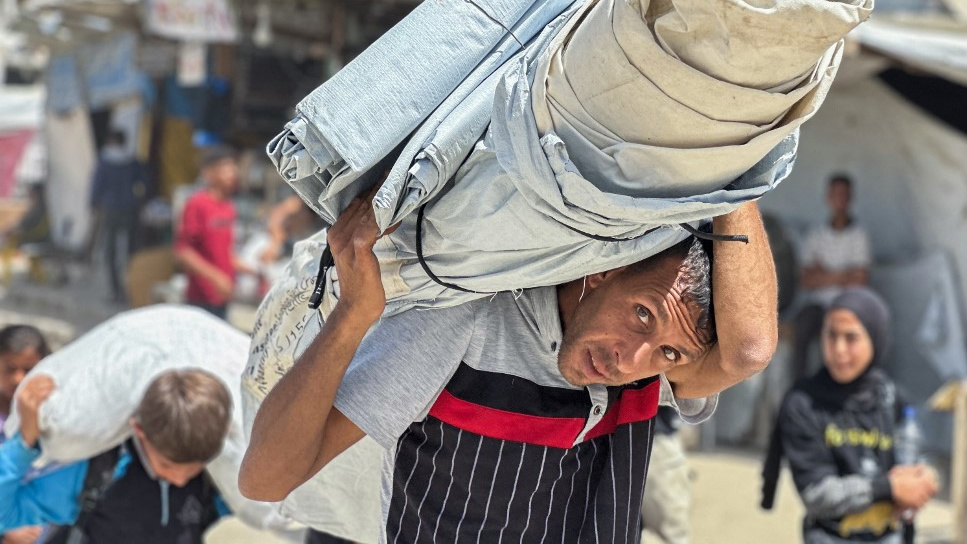The Israeli army last week posted on social media an announcement, in Arabic, ordering residents to leave Gaza’s Khan Younis area ahead of an “unprecedented attack”.
The statement, which ordered Palestinians to flee westwards towards al-Mawasi, said Khan Younis would thenceforth be considered a “dangerous combat zone”.
The order was accompanied by a map of the neighbourhoods of Khan Younis, most of which were shaded in red, and an arrow pointing towards the Mawasi “humanitarian zone”.
Moments after the warning was posted, the streets filled with tens of thousands of people wandering aimlessly. My friend, the journalist Saleh al-Natour, said what he witnessed that day was difficult to describe.
“I saw pain and oppression walking once again in human form through this city,” Natour told me. “They were fleeing in groups, from east to west, like an endless human flood … exhausted, frail bodies staggering like torn rags, covered in the dust of the surrounding destruction.
New MEE newsletter: Jerusalem Dispatch
Sign up to get the latest insights and analysis on
Israel-Palestine, alongside Turkey Unpacked and other MEE newsletters
“I heard people rambling in the streets, not knowing what to say or where to go,” he added. “Hungry and thirsty, they searched for water and collapsed in the streets from exhaustion and fear.”
Natour said many people were “crammed into narrow areas” as Israeli warplanes flew above them: “People are running through the streets with the planes overhead.”
Streets ‘choked with anguish’
One scene captured on video showed a young man pushing a wheelchair for a disabled child. Around his neck hung a small bag, while another bag was strapped to his back, and in his hand he carried a plastic bag with two loaves of bread.
In the middle of a road torn up by a previous Israeli incursion, and under the blazing sun, the young man’s strength gave out. He stopped pushing the wheelchair and sat down in the middle of the road.
Beside him was a woman wearing a prayer gown, the kind Palestinian women in Gaza usually throw on quickly when there’s no time to change clothes. Holding a blanket in her hand, she approached the young man – perhaps her son or brother – and reached out, trying to help him rise.
She gasped through her sobs, her words mixing with her tears: “We are dying. If they killed us, it would be more merciful. We’re exhausted, exhausted. We are not animals. We are human beings.”

Israel killed my family and destroyed my home. The world just kept scrolling
Read More »
In another scene, a sick woman lay on a hospital bed, covered with a pile of blankets. One of her legs dangled off the side of the bed, which was being pulled by four people along a shattered road strewn with rubble, trying to get her out of the danger zone.
Journalist Iman Baroud said the scale of the tragedy had become greater than any words could express.
“I feel ill from the horror I witnessed in the streets – I simply cannot describe it,” she said. “I feel broken by the sight of mothers and sisters who, exhausted from walking, decided to sleep on the sides of the main road, inside vendor stalls that were already empty of goods.
“The image of children sleeping in a way that speaks of torment, not rest – heads resting in their mothers’ laps, while their fragile, thin, hungry bodies lay on the pavement,” Baroud said.
Having lived through every chapter of this war, she added, the latest horrors are unlike anything the people of Gaza have witnessed before.
“The streets are choked with anguish, congested with tears,” she said. “No one sees anyone else’s exhaustion – every person carries their own burden and sorrow on their back and walks on.”
The views expressed in this article belong to the author and do not necessarily reflect the editorial policy of Middle East Eye.

